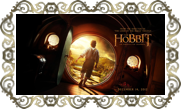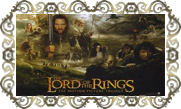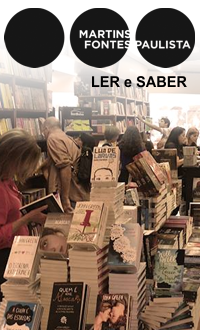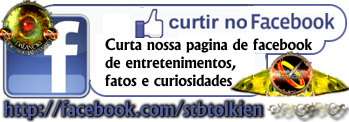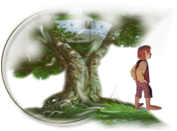

If there is one book that really has impressed me, it is Diana Glyer's The Company They Keep: C. S. Lewis and J.R.R. Tolkien as Writers in Community. I read the review by Josh B. Long and needed to read the book for myself. And read I did, while the content of the book is very great, important facts are discussed and compared, and there is tons of interesting information, it remains easy and is very enjoyable to read. This book will probably become the standard book when people need to know something about The Inklings. If you are interested in the Inklings, this is the book to read. I'm very proud to offer you all an interview that I did with Diana Glyer. Hope you will enjoy it, and don't forget... her book is a must have for Tolkien and inkling lovers! Q: Can you tell us a little about yourself?
I teach English at Azusa Pacific University in southern California. In addition to writing and teaching, I enjoy painting and gardening. My husband, Mike Glyer, is also a writer, and we have a five year old daughter named Sierra Grace. We just finished reading The Hobbit to her for the first time: that was fun!
Q: What did you like to read when you were a child?
I read anything and everything. I was a big fan of animal stories, especially books about horses. My first science fiction book was The Wonderful Flight to the Mushroom Planet, which remains one of my favorites.
Q: How did you first get interested in the inklings?
A group of high school friends read The Lord of the Rings, and they talked about it incessantly. I wanted to know what they were talking about, so I read it, too.
Q: I'd like to talk about your book, The Company They Keep. What prompted you to write the book?
When I found out that Tolkien and Lewis were close friends, I expected to see lots of discussion of their mutual influence. Instead, everywhere I looked, people kept denying that their interaction made any difference. That didn't seem right to me, so I decided to dig deep and find out everything I could about them.
Q: What special qualifications do you have for making this study? What makes you different from your colleagues?
Most people who study Tolkien or Lewis do it from a background in literature, or with theological concerns in mind. There are others, of course, who look at Tolkien's accomplishments as a linguist. My training is in Composition Studies. That means I am primarily interested in how writers actually create their works. I am interested in the writing process, writing groups, and the specific things that help writers to stay productive, inventive, fresh, and courageous.
Q: What is the biggest difference between your book and the biography of the Inklings by Humphrey Carpenter?
Great question! Carpenter focuses primarily on C. S. Lewis, and he gives a broad overview. I am interested in all 19 of the members. My book is about the whole web of connections, how they encouraged each other, confronted one another, how they prepared collaborative projects, even how they included each other as characters in their books. In fact, David Bratman has written a appendix to my book that offers a biography and a bibliography for each of these men-- and each one of them is really interesting.
Q: Is there any unpublished material inside your book?
There is material that is published here for the first time, including excerpts from letters and rough drafts of manuscripts, and also a long poem that Owen Barfield wrote about his friend C. S. Lewis. There is also a lot that has been published before, like book reviews and obituaries, but that most people won't have seen it because of its limited circulation.
Q: How long did the creation of this book take?
I have been working on the book for more than 20 years; David Bratman has been working to gather the detailed information found in the appendix for more than 25 years. What took so long? Part of it was the breadth of research, trying to read everything I could by these authors and about these authors. And I wanted to do as much primary research as possible. Part of it was I wanted to write this book with as much passion and clarity as I possibly could. All the best information in the world won't do any good unless the story is compelling.
Q: What is your hope for your readers?
One of my colleagues at APU, a professor of journalism and American Literature, told me that one of the things that he found most remarkable about The Company They Keep is that even if you don't know anything at all about Lewis or about Tolkien, the book is full of insight into the writing process and the nature of creativity. I like that. I know that fans will learn all kinds of new things about these great authors. But I like to think that what readers will come away with something bigger, that is, new energy and vision for their own creative work.
Q: To write the study, do you work alone or do you have help from others?
There a long list of collaborators on this project, including people who helped with the research, experts who read it through to check facts, editors who made any number of good suggestions, and friends and family who encouraged me along the way.
Q: I'd like to talk a bit about the actual process of writing. Do you have a special system for research and organization?
Not really. In fact, I wish I were more systematic. I found that I work best by doing some writing every day, and then scheduling a writing retreat each month to give me a longer block of time to really dig into the material.
Q: Where do you write?
I have a home office where I am surrounded by books and files. I compose on the computer, then print out each day's work and put it into a thick notebook. I always revise and edit the text by hand.
Q: Did you have to travel much?
I spent a great deal of time at the Wade Center at Wheaton College in Illinois, and also at the Huntington Library in Pasadena. Both are remarkable collections. Also, I am so grateful to Christopher Tolkien for producing The History of Middle-earth. It was one of my most important sources.
Q: When you're not working, what are your favorite ways to relax and have fun?
Having a pre-schooler means lots of time is spent coloring, playing dolls, and making up stories. Sierra loves music, so she likes to play on the piano, and also to lead musical marching parades through the living room. When I have time to myself, well, I love to find a quiet spot and read.
Q: A final question, which of the inklings is your favorite and why?
Ah, now that is an impossible question! Maybe I will say that in course of my research, I came to appreciate Lewis's brother, Warren Hamilton Lewis, more than ever. He was a great writer, and the Inkling with a particular gift for hospitality. One friend said that he was "always comfy to be around"; another said that hospitality was a natural for him as breathing. I don't know which Inkling is my favorite, but Warren Lewis may have been the easiest one to spend time with.
| Type: HardcoverEstimate: 288 pagesPublisher: Kent State University PressPublication Date: 30 Dec 2006Language: EnglishISBN: 0873388909Product Dimensions: 6.1 x 9.3 inches |
Spread the news about this J.R.R. Tolkien article:
Read more http://feedproxy.google.com/~r/TolkienLibrary/~3/uhbaYr0RdbY/The-Company-They-Keep.php
